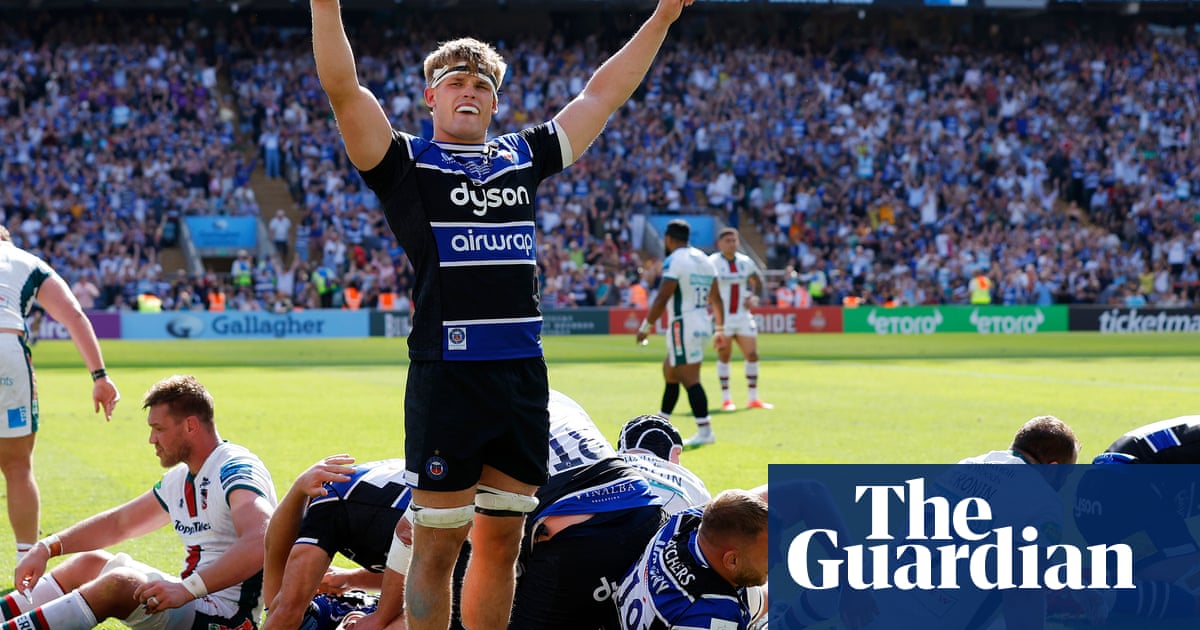At the 29th time of asking, Bath are champions of England once more. At five to five on a sunny afternoon here, Ben Spencer passed to Finn Russell – the married couple, as their coach, Johann van Graan, likes to call them – and Russell kicked it somewhere, anywhere but on the pitch toput an end to decades of pain out west.
In 1996, when titles were won the old-fashioned way, the notion it would take so long forBath, who had just won their sixth in eight years – their 10th cup in 13, and their fourth double – to become champions of England again would have seemed absurd. Only a little more absurd than the notion they wouldwin it would have seemed three years ago, when they finished bottom of the table, spared the indignity of relegation only by the very different way English rugby is organised these days.
The most telling difference, though, is that thing about paying players. In the 80s and 90s, Bath secured their pre-eminence, it is widely held, precisely by being ahead of the game, if not by paying their players, by getting them to approach their rugby as if they were. After 1996, when professionalism became a directive for everyone, that special edge was lost.
They regained it here. As in 1996, they have topped the table by playing the rugby of the gods, scoring a remarkable five tries a match on average, comfortably more than anyone else in English rugby history. That they still had to win the thing all over again by a knockout system enrages some, just as others accept a showpiece occasion as the ultimate test of would-be champions, not to mention the ultimate requirement of a sport that wants to showcase itself in these commercial times.
It turns out this iteration of Bath champions can win it that way too, just as they have twice elsewhere this season, in thePremiershipCup and the Challenge Cup. A treble. If only 1990s Bath had had one of those to play for.
You do not win anything much in rugby, then or now, without an authoritative pairing at half-back and the old married couple excelled themselves. Not only will fans of try-scoring be pleased about Bath’s reward, one Andy Farrell may be heartily encouraged too with the form of the frontrunner for the Lions No 10 shirt.
Russell’s genius has been an established reality these past 10 years or so, but his ability to orchestrate, to play it cool when the situation demands, has been more in doubt. There is ample evidence now to suggest he has matured, having passed those classic milestones in anyone’s life of fatherhood and hitting 30. On Saturday, he ran the game in understated fashion, without forgoing those little flashes.
His was the decisive moment, reading his opposite number’s pass to perfection. Handré Pollard is more or less the opposite of Russell, his match-winning hardness of temperament procuring him not just one World Cup medal but two, as pivot of those formidable Springboks. How telling, then, that he should shovel on the mantle for this season, at least, to a man far less decorated.
With the score 13-7 in Bath’s favour after an error-strewn first half, Russell intercepted Pollard’s pass and was away from his own half. Freddie Steward tried to run him down. He probably would not have made it, but Russell saw Max Ojomoh inside and threw what would turn out to be the match-winning pass to his centre.
We thought that we might for once have a final – hell, a match of any kind – concluded in timely fashion. All the more so when Guy Pepper had seemingly scored an outrageous solo try on the hour to open up a 25-7 lead for Bath. We should have known better. The minutest of knock-ons was spotted in the buildup and the try was revoked. Dynamic well and truly shifted.
Sign up toThe Breakdown
The latest rugby union news and analysis, plus all the week's action reviewed
after newsletter promotion
Now, let the spotlight shift toLeicester. They are nothing if not grafters. None more so than dear old Dan Cole. The last match of a long and storied career this was, but only minutes after his arrival he was off to spend the final minutes of his career in the sin-bin.
Leicester’s indiscipline rivalled Bath’s handling errors as decisive factors in a match that failed to ignite until those last minutes. The boos that met Cole’s yellow card for turning his shoulder as he tried to charge down Russell’s clearance were louder even than the cheers that had greeted his arrival from the bench.
Leicester endured two yellow cards, the other for their captain, Julián Montoya, in the first half, but as so often both were simple accidents. Far worthier of yellow was their fellow front-rower Nicky Smith’s handling on the deck as Bath seemed set to score late in the first half. That was deliberate; the other two were not.
But such is the sport these days. Even though Leicester rallied to score their third try with five to go, the excellent Emeka Ilione finishing round the fringes, just as Solomone Kata had a few minutes earlier, all with Cole in the bin, Bath managed to hold out.
How different it all seems from the 20th century. And yet how very much the same.
